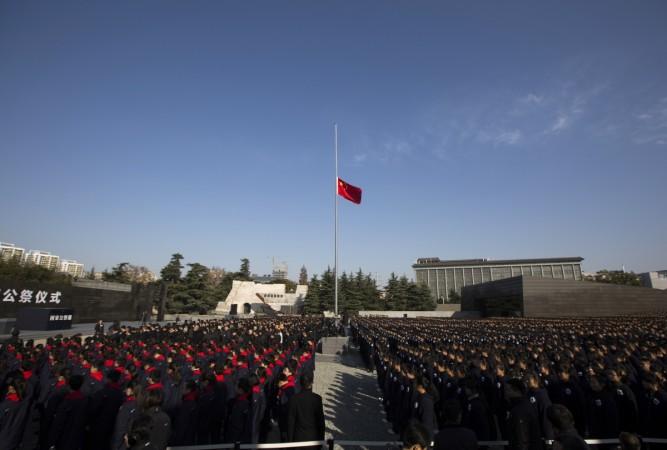China observed the National Memorial Day on 13 December to mark the Nanjing Massacre in 1937, when more than 300,000 Chinese were killed by the Japanese army
This year marks the 77th anniversary of the "rape of Nanjing", the week-long rampage by Imperial Japanese soldiers killing 300,000 Chinese citizens and raping about 20,000 women; however, it is the first time the event has been observed as a national holiday , reports Xinhuanet.
China and Japan have long been sparring over their painful history and the Japanese Prime Minister Shinzo Abe, has even been accused by China of reviving militarism. It had even dubbed militarism as the "the haunting Voldemort of Japan" . China was upset when Abe visited the Yasukuni Shrine, the Tokyo landmark that memorialises martyrs from Japan, including those who died in World War II.
Now, however, Chinese President Xi Jinping is asking his countrymen to forget hatred and not allow the minority who led Japan to war to affect international relations of the two countries.

During the 40-minute memorial ritual held in the eastern city of Nanjing, the audience sang the Chinese national anthem, soldiers laid wreaths, and an 85-year-old representative of the 1937 massacre's survivors joined President Jinping on stage.
At 4.30 am (IST), the memorial hall lowered China's national flag to half-mast and the memorial ceremony began at 7.31 am (IST). After the mass rendition of the Chinese national anthem, all gathered at the memorial hall observed a minute of silence.
Following the laying of wreaths, 77 teenagers read the declaration of peace. Xia Shuqin, the representative of the Nanjing Massacre survivors, accompanied President Jinping in unveiling the Public Memorial Tripod. They were also joined by a 13-year-old student, Ruan Wenze, whose numerous family members died during the Nanjing Massacre.
During his speech, Jinping expressed his wish that Chinese people would stick to the path of peaceful development and that they would "remember history, cherish peace and create a better future."
"Chinese and Japanese people should keep their friendship from generation to generation, learn from history and look forward to a future where they can contribute towards peace for all mankind," Chinese president added.
After a peace bell was rung by the six representatives, 3,000 doves were released into the air before the ceremony came to an end.













